
The 3rd International Conference On Radioscience, Equatorial Atmospheric Science and Environment (INCREASE) 2023
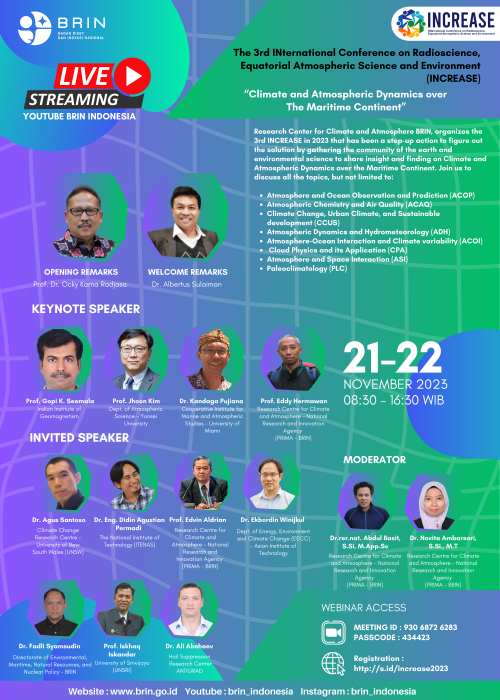
The 3rd INternational Conference on Radioscience, Equatorial Atmospheric Science and Environment (INCREASE) is a step-up action to figure out the solution by gathering the community of the earth and environmental science to share insight and findings on Climate and Atmospheric Dynamics over the Maritime Continent.
The first INCREASE was held in 2021 in collaboration with the Research Institute for Sustainable Humanosphere (RISH) Kyoto University and Asian Research Network (ARN) covering the theme of ATMOSPHERIC SCIENCE, SPACE SCIENCE, OCEAN SCIENCE, LAND SCIENCE, PALEOSCIENCE, ECOLOGY, CHEMISTRY, BIOCHEMISTRY, ELECTROMAGNETIC, ENGINEERING and AGRICULTURE.
The second INCREASE event was held virtually last year (2022), covering the same scopes with the first increase; the conference had successfully gathered researchers in the field of atmosphere and climate to present their research work in the field of CLIMATE and ATMOSPHERIC SCIENCE in general.
Repeating the previous successful conferences, the third INCREASE will be held on 21 – 22 November 2023 by gathering the community of the earth and environmental science to share insight and findings on Climate and Atmospheric Dynamics over the Maritime Continent. This year INCREASE will be the third time to be held in full online format. This conference is organized by the Research Center for Climate and Atmosphere (PRIMA) of the National Research and Innovation Agency (BRIN).
We will welcome a diverse community of scientists, students, and educators to convene and connect in the INCREASE 2023; thus, they can discuss ideas and current issues and design solutions in the areas of environmental and atmospheric science, climate change and sustainable development in the equatorial region, including but not limited to below topics and sub-topics:
- Atmosphere and Ocean Observation and Prediction (ACOP)
- Atmospheric-Ocean observation technology
- Artificial intelligence for Atmospheric-Ocean prediction
- Atmospheric-Ocean retrieval method
- Atmospheric Chemistry and Air Quality (ACAQ)
- Air quality monitoring and modeling
- Air pollution exposure and impact
- Atmospheric chemistry-weather/climate interaction
- Air pollution public policy to support sustainable development
- Climate Change, Urban Climate, and Sustainable development (CCUS)
- Changing climate and climate variability, and their impacts on development sectors (agriculture/food, water resources, health, marine and coastal resources), environment, and regions
- Risks and vulnerabilities of the development sector, environment and society to climate change
- Climate change adaptation, nature-based solution, ecosystem-based adaptation, and adaptation technology
- Climate resilience development in urban and suburban areas
- Atmospheric dynamics and hydrometeorology (ADH)
- Hydrometeorology
- Hydrometeorological disaster (risk, prevention, adaptation, and mitigation).
- Weather and climate process
- Atmospheric waves
- Atmosphere-Ocean Interaction and Climate variability (ACOI)
- Observation and modeling atmosphere-ocean interaction
- Seasonal prediction
- Climate variability
- Physical and dynamics of oceanography
- Tropical meteorology and oceanography
- Biogeochemistry
- Cloud Physics and its Application (CPA)
- Rainfall microphysics characteristics
- cloud physics application
- Atmosphere and Space Interaction (ASI)
- Ionospheric Dynamics/ Disturbance/ Model
- Solar wind-Magnetosphere-Ionospher Atmosphere coupling
- Lithosphere–Atmosphere–Ionosphere–Magnetosphere coupling
- Effects of ionosphere on Global Navigation Satellite Systems (GNSS)
- Paleoclimatology (PLC)
- Paleoclimate and paleoenvironmental reconstruction
- Paleo (past) biodiversity changes
Participants are allowed to submit their papers and present their findings by oral or video presentations via an online platform. The selected paper will be published in the SPRINGER proceeding.
Keynote Speakers
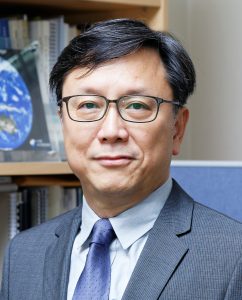
Jhoon Kim, Yonsei Lee Youn Jae Fellow Professor of atmospheric science, has worked on remote sensing of aerosol and trace gases including air pollutants and greenhouse gases. He received the B.S. degree in atmospheric sciences from Seoul National University, Seoul, South Korea, in 1986, and the Ph.D. degree in atmospheric and space sciences from the University of Michigan, Ann Arbor, MI, USA, in 1991. From 1991 to 2003, he was a Principal Researcher with the Korea Aerospace Research Institute, Daejon, South Korea. He has authored over 230 articles and holds many patents. He is a P.I. of the Geostationary Environment Monitoring Spectrometer (GEMS), the first satellite instrument for air quality monitoring from GEO at unprecedented spatial and temporal resolution. He developed sophisticated algorithm to retrieve aerosol and gas properties, with machine learning for the conversion to surface concentrations and data fusion for better accuracy based on big data science.
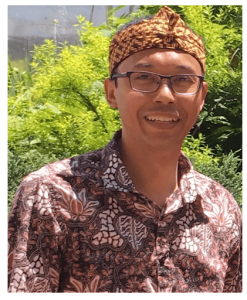
Dr. Kandaga Pujiana is an Assistant Scientist at the Cooperative Institute for Marine and Atmospheric Studies at the University of Miami. He completed his Ph.D. in Ocean and Climate Physics at Columbia University. Dr. Pujiana’s research interests extend from examining the importance of oceanic processes in ocean-atmosphere interactions to extracting dynamical constraints from multi-faceted observations in terms of theory for large-scale ocean circulations and waves. His current research attempts to assess anomalous changes in oceanic processes such as western boundary currents and the meridional overturning circulation, with significant implications on inter-ocean heat and freshwater exchanges and potentially climate variability. Dr. Pujiana is apart of the XBT science team at AOML.
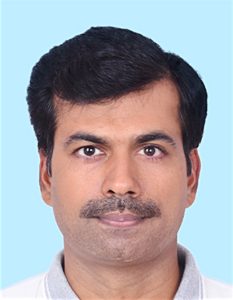
Dr. Gopi K. Seemala
Professor E
Indian Institute of Geomagnetism (IIG)
Dr. Gopi K. Seemala research area are study of ionospheric dynamics, density variations and irregularities using various ground based and satellite borne instruments; Lithosphere-Ionosphere coupling; Space Weather effects, applications to GNSS aided navigation (SBAS) and error mitigation.
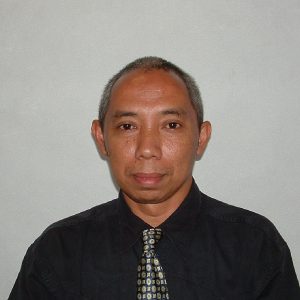
Prof. Eddy Hermawan
Research Centre for Climate and Atmosphere
National Research and Innovation Agency (PRIMA - BRIN)*
Research Professor in National Research and Innovation Agency (BRIN)
Hydrometeorological Hazards Research Group, Center for Climate and Atmospheric Research (PRIMA)
Magister and Ph.D. degree in Atmospheric Science – University of Kyoto (1999)
- 1990 – 2021 Researcher at the Indonesian National Institute of Aeronautics and Space (LAPAN)
- 2012 appointed as a Research Professor in Meteorology by the Indonesian Institute of Sciences (LIPI).
- Since 2021 as Principal Researcher and Project Investigator Center for Climate and Atmospheric Research (PRIMA), National Research and Innovation Agency (BRIN)
Since 2022 published at least 4 highly reputable international journal publications
Focusing on the Synoptic aspect of the mechanisms behind extreme or heavy rainfall events, in Semarang, The New National Capital City (IKN), and Jakarta
Invited Speakers
- Dr. Agus Santoso – Climate Change Research Centre – University of New South Wales (UNSW)
- Dr. Eng. Didin Agustian Permadi – The National Institute of Technology (ITENAS)
- Prof. Edvin Aldrian – Research Centre for Climate and Atmosphere – BRIN
- Dr. Ekbordin Winijkul – Dept. of Energy, Environment and Climate Change (EECC) – Asian Institute of Technology
- Dr. Fadli Syamsudin – Directorate of Environmental, Maritime, Natural Resources, and Nuclear Policy – BRIN
- Prof. Iskhaq Iskandar – University of Sriwijaya (UNSRI)
- Dr. Ali M. Abshaev – Hail Suppression Research Center – Rusia
Guideline for Abstract/Paper Submission
All abstract must be submitted through BRIN-form provided
here: ABSTRACT SUBMISSION
The abstract should be not more than 300 words in a paragraph and be written in English. The abstract simply describes the notable aspects of the content briefly.
Selected/accepted abstract will be notified by registered contact information provided by the author in the abstract form. Then the author submits the full paper with the information provided by the committee.
Important Date
- Call For Paper : 15 July 2023
- Abstract Acceptance Deadline :
15 August 202317 Agustus 2023 - Abstract Acceptance Notification :
26 August 2023 - Full Paper Deadline Submission :
25 September 202330 September 2023 - Paper Review Process : 30 September – 30 October 2023
- Full Paper Acceptance Notification : 30 October 2023
- Paper Revision Process : 30 October –
14 November 2023 - Full Paper Final Submission :
15 November 2023 - Video and Presentation File Deadline submission : 17 November 2023
- INCREASE : 21 – 22 November 2023
Previous Event
List of related/similar conferences and symposiums:
- The second INCREASE 2022 (The INternational Conference on Radioscience, Equatorial Atmospheric Science and Environment)
- The first INCREASE 2021 (The INternational Conference on Radioscience, Equatorial Atmospheric Science and Environment)
- ICTMAS (International Conference on Tropical Meteorology and Atmospheric Sciences)
- ISAST (International Seminar on Aerospace Science and Technology)
- LISAT (The International Symposium on LAPAN-IPB Satellite)
Previous INCREASE proceeding books:
- The 1st INCREASE : https://link.springer.com/book/10.1007/978-981-19-0308-3
- The 2nd INCREASE : https://link.springer.com/book/10.1007/978-981-19-9768-6
Venue
The seminar will be held virtually. The virtual format allows for increased accessibility and flexibility, enabling participants to engage in the conference’s activities regardless of their location.
The conference’s online platform can be seen at INCREASE 2023 micro site, offering attendees a seamless and interactive experience that connects participants from around the world.
Registration
Registration fee: Free
Registration and paper submission is FREE of charge. The selected paper will be published in the SPRINGER proceeding.
How to register
The conference registration can be done via the following link: CLICK HERE TO REGISTER https://s.id/1WA4F
The abstract submission form can be sent via the following link:
https://form.brin.go.id/s-f/increase-2023
For the identity section, especially the email address to be filled with an active email address. All information about this conference other than listed on the website, we will send it via participant email. Participants who submit the papers can choose the oral presenter. Then participants who will not submit papers or as co-authors can register as regular participants.
Program
The program for Day 1 and Day 2 available from INCREASE 2023 micro site
Participants
TBA
Organizing Committee
General Coordinator;
Dr. Albertus Sulaiman, S.Si. M.Si.
Advisory Board;
Dr. Asif Awaludin, S.T, M.T.
Dr. Heru Santoso, M.App.Sc
Prof. Dr. Ninong Komala, M.Sc.
Dr. Erma Yulihastin, S.Si., M.Si.
Dr. Eng. Prayitno Abadi, S.Si. M.Si
Prof. Dr Sri Yudawati Cahyarini, S.T., M.T.
Dr. Eng. Wendi Harjupa, ST., M.Eng.
Chairman
Dr. Halda Aditya Belgaman, S.Si., M.S.M.
Secretariat
Rahmawati Syahdiza, S.Si., M.Sc.
Nani Cholianawati, S.T.
IT and Website
Farham Harvianto, M.Kom.
Ifuk Permana S.Kom.
Paper Submission
Nyayu Fatimah Zahroh, S.Si., M.Sc.
Drs. Saipul Hamdi, M.Sc.
Dessy Gusnita, S.Si.
Event
Asri Indrawati S.Si., M.T.
Dyah Aries Tanti S.Si.
Tiin Sinatra S.Si., M.Si.
Editors
Sopia Lestari S.Si., M.Si., Ph.D. (Chief Editor)
Ginaldi Ari Nugroho, S.T., M.Si., Ph.D.
Dr. Moch Syarif Romadhon
Dra. Sumaryati M.T
Drs. Afif Budiyono MT.
Dr. Asep Sandra Budiman
Dr. Noersomadi S.Si., M.Si.
Dr. Trismidianto M.Si.
Dr. Heru Santoso M.App.Sc
Herlina Ika Ratnawati, M.Si
Sri Ekawati, M. Si
Dyah Rahayu Martiningrum, M. Si
Dr. Marfasran Hendrizan S.T., MT.
Dr.rer.nat. Abdul Basit, S.Si., M.App.Sc.
Publication and Documentation
Muhtar Gunawan
